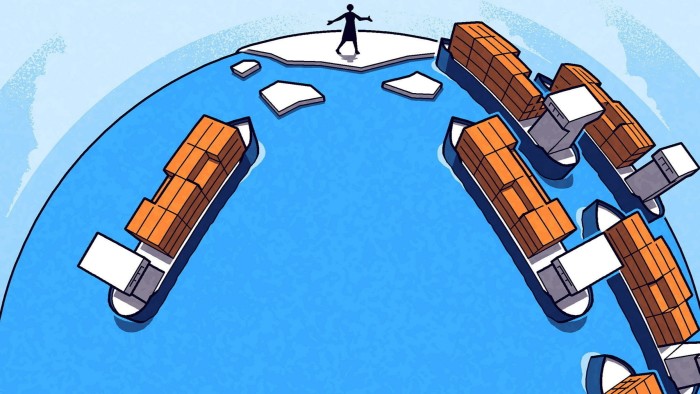Unlock the White House Watch newsletter for free
Your guide to what the 2024 US election means for Washington and the world
The world looks different from the North Pole. Most maps chart the planet from east to west. But look at the world from the top down, and you suddenly see America’s relative position anew. Russia dominates the region. Greenland suddenly seems important, as does Canada. China, a “near-Arctic” nation, is a bit too close for comfort. The US, by comparison, is small. Alaska, its biggest state by territory, is a fraction of the view.
That world view is at the centre of the Trump administration’s new goal to “make shipbuilding great again”, courtesy of an upcoming executive order (which may drop as early as this week). This lays out the most ambitious industrial strategy in the shipbuilding sector since the Americans turned out 2,710 “liberty ships” in the space of four years during the second world war.
It will also be a topic at Monday’s Office of the US Trade Representative hearings on proposed remedies to combat China’s ringfencing of the global maritime, logistics and shipbuilding sectors.
In the 19th century, the British and Russian empires battled for primacy in central Asia, in a multi-decade struggle that became known as the “Great Game”. The territorial lines drawn across Persia, Afghanistan, Tibet and India in this period defined the geopolitics and economics of the next century.
Today, there is a new Great Game being played — not in central Asia, nor even in modern hot zones such as Ukraine, Gaza or the South China Sea, but rather in the frigid waters of the Arctic. Dominance in this region will be crucial to strategic control of the entire western hemisphere, which is a goal of the Trump administration.
BlackRock’s agreement to buy ports in the Panama Canal from Hong Kong billionaire Li Ka-shing goes some way towards that goal. This comes at a time when military experts say risk is as high as it has been in decades thanks to increased piracy, Russia’s invasion of Ukraine and the Black Sea, underwater cable snapping in the Baltic, Houthi rebel attacks in the Red Sea and more Chinese military activity in the Pacific.
But the Arctic, where the Chinese and Russians conducted naval drills together last year, is one of the few places where new sea routes are actually opening (due to climate change). A key element of the new Great Game will be building US maritime capacity to exploit mineral resources and lanes of commerce, lay new fibre optic communication cables that can be better policed by America, and create more security presence in the region.
Icebreakers are top of the list for Donald Trump, who came up with the plan to build polar cutters with the Finns and Canadians at the end of his first term (a deal that was inked by the Biden administration, proving maritime and Arctic security are a rare bipartisan point of agreement). The US hasn’t built one in over a quarter of a century, but a White House source tells me Trump would like to see this done by the end of his second term.
The US also wants to control more of its own commercial shipping. America today has 185 ocean-going commercial vessels. China has 5,500. In theory, Beijing could turn off the American economy by choking off access to that shipping fleet and blockading the most important supply chains through the South China Sea. Given that it is from commercial fleets that the US military gets most of its supplies, even in wartime, it could also incapacitate any future American war effort.
A key pillar of the Trump strategy will be to bring together the commercial and military sides of shipbuilding. “This new office aims to reform procurement, boost demand and remove barriers to US shipbuilders’ competitiveness — giving them the confidence to invest in the industry’s long-term future,” says Ian Bennitt, special assistant to the president and senior director for maritime and industrial capacity at the National Security Council.
This is a big deal. It is very much the industrial strategy that put the Chinese on top in this domain and so many other industries, and it also represents a radical departure from the Reagan approach of decoupling the two areas, as part of a larger decrease in public subsidy of industry.
By contrast, many people within the Trump administration — from national security adviser Mike Waltz to secretary of state Marco Rubio, to White House economic adviser Peter Navarro and USTR Jamieson Greer — are pushing ships as the new chips, to paraphrase former Biden security adviser Jake Sullivan, who praised the Trump plan.
A leaked draft of the executive order shows the administration is planning to use a variety of carrots and sticks, from port fees on Chinese vessels, to a Maritime Security Trust fund (utilising tax credits, grants and loans for building and workforce training) to trade sanctions to bolster the industry. That will inevitably require working with allies such as South Korea (Hanwha has bought the Philadelphia shipyard), Japan, Finland, Canada and others.
Can Trump stay the course here? He’s already told the Canadians he won’t let them use US icebreakers until they become the 51st state of the union, though sources tell me that the ICE Pact work with Canada and Finland is continuing, unaffected by trade issues.
America’s maritime capacity has atrophied to such an extent that alliances will be crucial to rebuilding it. This Great Game can’t be played alone.
Read the full article here




